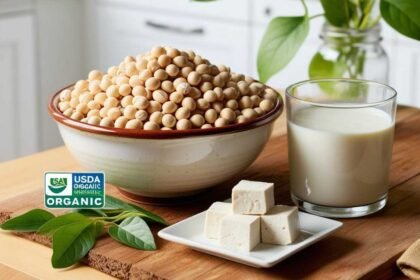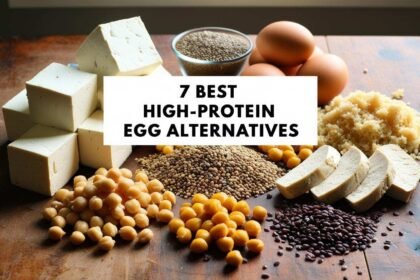When you think of high-protein foods, eggs probably top the list. They’re a breakfast staple, beloved by fitness enthusiasts and health-conscious eaters alike.
A single large egg contains around 6 grams of protein, making it a reliable source of nutrition. But did you know that plant based protein foods can sometimes offer even more protein than eggs – gram for gram?
In today’s world, where more people are shifting towards plant-based diets for health, environmental, or ethical reasons, finding high-protein, plant-based alternatives has never been more important.
Whether you’re vegan, vegetarian, or simply trying to eat more plant-based meals, these foods can help you meet your protein goals without relying on animal products.
Let’s explore six powerful plant based foods that pack more protein than eggs and why they deserve a place on your plate.
1. Edamame – A Green Protein Powerhouse
Protein content: ~11 grams per 100 grams
Edamame are young soybeans, often enjoyed steamed with a pinch of salt. They may look small, but they’re a nutritional powerhouse.
Edamame contains all nine essential amino acids, making it a complete protein something rare in the plant world.
In just one cup, you get more protein than an egg, plus added fiber, iron, and magnesium.
Whether tossed into salads, stir-fried with veggies, or eaten as a snack, edamame is a versatile and high-quality plant based protein option.
2. Lentils – The Budget-Friendly Protein Giant
Protein content: ~9 grams per 100 grams (cooked)
Lentils are a staple in many cuisines around the world, from Indian dals to Mediterranean soups.
They are not only rich in plant based protein, but also offer complex carbohydrates, iron, and plenty of fiber.
Unlike eggs, lentils contain zero cholesterol and very little fat, making them ideal for heart health.
Plus, they’re affordable and shelf-stable perfect for meal prep and bulk cooking.
3. Tofu – The Meat Substitute With Muscle
Protein content: ~15 grams per 100 grams (firm tofu)
Made from soybeans, tofu is another complete plant based protein that rivals many animal-based foods.
Firm tofu especially packs a serious protein punch more than double the amount in a single egg.
It easily takes on the flavor of whatever you cook it with, making it an excellent meat substitute in a wide variety of dishes curries, stir-fries, sandwiches, or even grilled as a steak alternative.
4. Hemp Seeds – Tiny Seeds, Huge Protein
Protein content: ~31 grams per 100 grams
Don’t be fooled by their size. Hemp seeds are one of the most protein-rich seeds available.
Just three tablespoons of hemp seeds provide nearly 10 grams of protein, outshining an egg in both quantity and quality.
They’re also rich in omega-3 fatty acids, magnesium, and iron.
You can sprinkle them over oatmeal, blend them into smoothies, or stir them into salads for a protein-rich plant-based boost.
5. Spirulina – The Superfood from the Sea
Protein content: ~57 grams per 100 grams (dried powder)
Spirulina is a blue-green algae that’s often sold as a powder or supplement. It’s not just a superfood, it’s a super protein.
Gram for gram, it offers nearly 10 times more protein than an egg.
In addition to being a fantastic plant based protein source, spirulina is packed with antioxidants, B vitamins, and iron.
Add a spoonful to your smoothie or mix it into energy balls for a unique nutritional upgrade.
6. Tempeh – The Fermented Protein Star
Protein content: ~19 grams per 100 grams
Tempeh is a traditional Indonesian food made by fermenting soybeans. It has a firm texture and a nutty flavor that holds up well in savory dishes.
Because it’s fermented, tempeh not only provides a high amount of plant based protein, but also supports gut health.
Its dense structure makes it ideal for grilling, slicing into sandwiches, or marinating like meat.
Why Choose Plant Based Protein Over Eggs?
While eggs are certainly nutritious, incorporating plant based protein into your diet offers some unique advantages:
- Zero cholesterol: Most plant proteins are cholesterol-free.
- Rich in fiber: Eggs lack fiber entirely, but plant-based foods provide plenty.
- Lower environmental impact: Producing plant protein typically requires fewer resources than animal farming.
- Diverse nutrients: Many plant based proteins come with added vitamins, minerals, and antioxidants.
Final Thoughts
Whether you’re fully vegan or just looking to eat less meat and eggs, these plant based protein sources can help you stay energized, support muscle growth, and improve your overall health.
With so many delicious, protein-rich plant foods available today, going green with your protein has never been easier or tastier.
So next time you’re thinking about grabbing an egg for protein, consider one of these six plant-based powerhouses instead. Your body and the planet will thank you.












